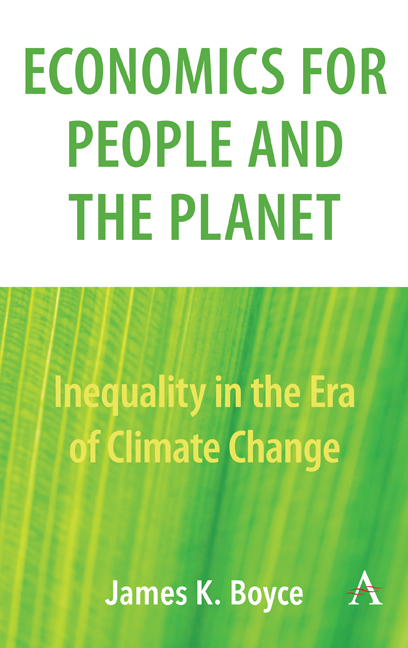Book contents
- Frontmatter
- Contents
- List of Illustrations
- Acknowledgements
- Part I Rethinking Economics and the Environment
- Part II Environmental Injustice
- Part III Climate Policy
- Chapter 17 Smart Climate Policy
- Chapter 18 Investment in Disadvantaged Communities
- Chapter 19 Dividends for All
- Chapter 20 Truth Spill
- Chapter 21 Four Pillars of Climate Justice
- Chapter 22 The Perverse Logic of Offsets
- Chapter 23 Climate Policy as Wealth Creation
- Chapter 24 The Carbon Dividend
- Chapter 25 Keeping the Government Whole
- Chapter 26 Air Quality Co-benefits in Climate Policy
- Chapter 27 Climate Adaptation: Protecting Money or People?
- Chapter 28 Forging a Sustainable Climate Policy
- Notes
- Publication History
- Index
Chapter 23 - Climate Policy as Wealth Creation
from Part III - Climate Policy
Published online by Cambridge University Press: 12 February 2019
- Frontmatter
- Contents
- List of Illustrations
- Acknowledgements
- Part I Rethinking Economics and the Environment
- Part II Environmental Injustice
- Part III Climate Policy
- Chapter 17 Smart Climate Policy
- Chapter 18 Investment in Disadvantaged Communities
- Chapter 19 Dividends for All
- Chapter 20 Truth Spill
- Chapter 21 Four Pillars of Climate Justice
- Chapter 22 The Perverse Logic of Offsets
- Chapter 23 Climate Policy as Wealth Creation
- Chapter 24 The Carbon Dividend
- Chapter 25 Keeping the Government Whole
- Chapter 26 Air Quality Co-benefits in Climate Policy
- Chapter 27 Climate Adaptation: Protecting Money or People?
- Chapter 28 Forging a Sustainable Climate Policy
- Notes
- Publication History
- Index
Summary
Returning carbon revenues to the public as dividends would embody the principle that we all own Earth's resources in equal and common measure. Excerpted from a lecture presented at the University of Pittsburgh in March 2014.
Broadly speaking, there are two types of policies to reduce carbon emissions from fossil-fuel combustion. One set of policies operates on the demand side of the picture to reduce our need for fossil fuels. These include investments in energy efficiency, mass transit and alternative sources of energy–investments that result in lower demand for fossil fuels at any given price.
The other set of policies operates on the supply side. These policies increase the price of fossil fuels by putting a tax on carbon emissions or, alternatively, by putting a cap the amount of fossil fuels we use and hence on emissions. The result is similar to what happens when OPEC restricts supply in order to increase the price of oil.
Why Climate Policies on the Supply Side?
Policies that aim to shift demand–via investments in mass transit, clean and renewable energy, or energy efficiency–often take time, maybe even decades, to be implemented fully. If we want to see significant reductions in fossil-fuel use in the short run, we need policies that operate on the price and reduce consumption today. This is one reason why I think that price-based policies ought to be part of the policy mix.
In addition, price-based policies themselves can be critical in reducing demand over the longer run. When consumers, households, firms and publicsector institutions know that over the next decade or two the price of fossil fuels will rise inexorably due to policies that curtail supply, they will have a powerful incentive to make investments in energy efficiency and renewable energy sources. They will face price signals that push that investment forward.
The easiest way to put a price on carbon emissions is through an upstream system, which means that you apply the price where the carbon enters the economy, not where it comes out the smokestack or tailpipe. So that means at the tanker terminals, the pipelines and the coal-mine heads.
- Type
- Chapter
- Information
- Economics for People and the PlanetInequality in the Era of Climate Change, pp. 109 - 114Publisher: Anthem PressPrint publication year: 2019



